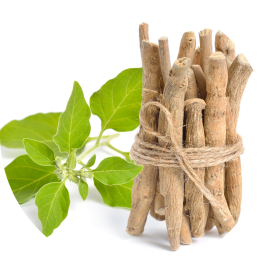
Mood • Motivation • Energy • Resilience • Focus
Ashwagandha is likely the most celebrated adaptogen in traditional medicine and modern adaptogenic herb blends. Known to boost energy by promoting stress resilience, it also supports mood and sleep.
Ashwagandha is native to India and North Africa where it is commonly seen as a small, evergreen shrub. This powerhouse adaptogen has been used in traditional medicine for over 5000 years, particularly for strength, mood and relaxation.*
Today, Ashwagandha is considered an adaptogen because it protects against the effects of stress. Adaptogens are the most selective class of plants in botanical medicines; they are thought to work by reducing the impact of stress to mind and body. Ashwagandha offers nootropic benefits, too, promoting clarity and endurance.*
- Sleep
- Stress Response
- Mood
- Energy
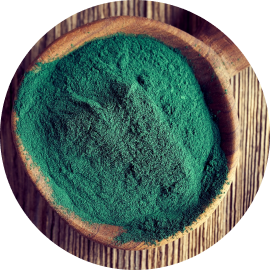
Inflammation • Endurance• Thermogenesis
One of the most nutrient-dense foods on the planet, spirulina is rich in vitamins, minerals and antioxidants. Over 75% of spirulina's dry weight is protein, over 80% of which is digestible.
The Aztecs were among the first to document the harvest, of what many call The Original Superfood from the surface of Lake Texcoco. A blue-green algae, spirulina's value and importance were noted in their writings, which aligned its consumption with the ability to increase stamina. Later, Spanish colonists drained the lake in order to construct the foundation for Mexico City, which led to the decline of its availability and subsequent use.
Spirulina was later ‘rediscovered’ by researchers in the 1960s and found that up to 77% of its dry weight was protein. It was also found to be a source of several important vitamins including A, B, E, K, beta-carotene, and several health-supporting minerals, including iron, zinc, potassium, calcium, magnesium, copper, selenium, and chromium.
- Metabolism
- Immunity
- Cholesterol
- Antioxidant support
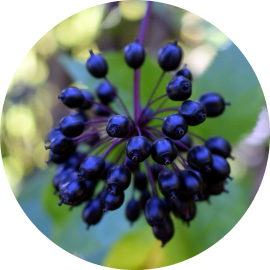
Energy • Stamina • Sleep
An adaptogen whose use dates back over 2000 years, Eleuthero, a cousin of Ashwagandha, is most-often used to support energy reserves and performance, both mental and physical.
A small shrub native to Russia and other parts of Northern Asia, eleuthero was first used to increase performance and quality of life and was later accepted as an adaptogen. Adaptogens are classifications of botanical medicines which help the body resist the physical and psychological impacts of stress.
The discovery of eleuthero was somewhat by accident. At the time, the popularity of Panax ginseng (Asian Ginseng) led to over-harvesting and inevitably the threat of extinction. Russian scientists began looking for alternatives within the plant’s family of related species. It was at that time eleuthero was discovered to have similar therapeutic effects to Asian ginseng. However, unlike Asian ginseng, eleuthero was a much hardier plant and more importantly one not threatened by extinction. It quickly became a preferred substitute as eleuthero had other benefits that Asian Ginseng didn’t offer.
- Athletic performance
- Mood
- Sleep
- Stress resilience
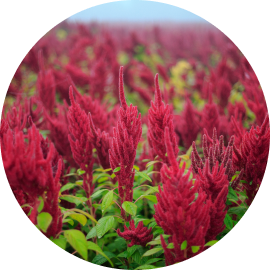
Athletic Performance • Nutrition • Immunity
A superfood cultivated for over 8000 years by the peoples of Central and South America, amaranth has recently gained popularity with high-performance athletes for its sustainable energy support. *
Amaranth has been a food prized by indigenous peoples of the Americas for as long as 8000 years. In fact, amaranth was so valuable that among the Aztec/Mexica it was also used as a form of currency. However, after the colonial Spaniards arrived, they outlawed its consumption and cultivation, and the plants use in the area was almost lost to history until its nutritional content was ‘rediscovered’ by researchers in the 1970s.
A versatile pseudo-cereal, this ancient superfood was sought after for its nutrient-dense makeup, its variety of uses, and its resistance to pests and blights. Over the previous decades, researchers have identified the key nutritional elements of amaranth that make it such a powerful wellness ingredient, including vitamin C, beta-carotene, calcium, iron, zinc, and healthy fatty acids like Omega-6.
Notably, amaranth outpaces other seed-grains in protein content, containing specific amino acids that are hard to find in our diets.*
- Energy
- Mood
- Performance
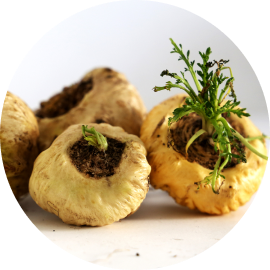
Energy • Mood • Endurance
A cruciferous vegetable related to broccoli, and kale, consuming the root of this adaptogenic herb supports against the detrimental effects of stress by maintaining energy levels and mood.
Maca is a root vegetable that grows in the Andes Mountains, particularly the highlands of Peru, which is why it’s sometimes referred to as Peruvian ginseng. The maca root was domesticated nearly 6000 years ago, and has had both culinary and medicinal applications for over 3600 years. Traditionally, it has been used for vitality, and energy.
Today, maca is researched for its ability to increase energy and stamina in athletes as well as to promote mood. * It has become particularly popular as a superfood and an adaptogen utilized for an array of energy-boosting purposes. Recent studies in athletes imply using maca for energy may have far-reaching benefits without the jitteriness that can come from other energetics.
- Cognitive performance
- Stress response
- Mood
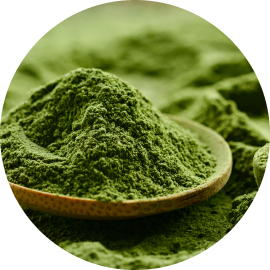
Calm Concentration • Nightly Recovery
An amino acid found in some plant and fungal species, L-theanine has been shown to promote relaxation without drowsiness. Theanine is a popular ingredient in modern energy and wellness supplements.
L-theanine was identified by Japanese researchers as a naturally occurring substance found in green tea in 1949. Shortly after, it was quickly added to foods, drinks and supplements throughout Asia, touted as the magical ingredient within green tea’s fabled medical history. L-theanine is categorized as a plant-derived nootropic because its perceived benefits are a result of its interaction with key neurotransmitters in the brain. *
Today, l-theanine is thought to reduce the physiological and psychological response to stress. It has also been shown to increase mental alertness and attention without stimulating the heart or causing nervousness. In fact, studies on theanine have observed it calm moods and reduces sleep disturbances while simultaneously reducing error rates in cognitive tests.*
- Cognitive performance
- Stress response
- Attention
- Mood
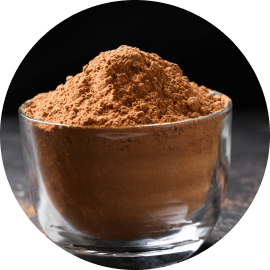
Stress Response • Mood • Clarity
A naturally-occurring amino acid that acts as the main inhibitory neurotransmitter in humans, GABA is a nootropic that decreases nervous system activity, relaxing you from a cellular level.
GABA was identified over 50 years ago but its value as a neurotransmitter was not fully realized until decades later. Today, we understand that almost 50% of inhibitory synaptic processing relies solely on GABA. In other words, the brain requires GABA to reduce nerve impulses related to stimuli like stress, and agitation. In fact, its discovery has led to a bevy of new and important supplements still used today.*
Our bodies produce some GABA naturally, but this powerful nootropic can also be found in brown rice, barley, adzuki, mung beans, and soy. It is also believed that some probiotic species like Lactobacillus also contain GABA, as well as other fermented food products like kimchi and fermented fruit juice.
- Stress/cortisol
- Muscle Support
- Attention
- Sleep/relaxation
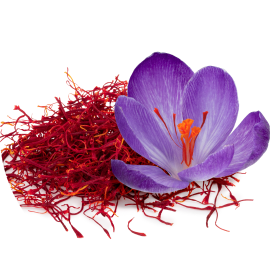
Mood • Nightly Recovery • Cognition
Affron® is a premium saffron extract standardized to 3.5% Lepticrosalides™. This nootropic compound has been shown to support mood in people with occasional stress and uneasiness.
Saffron is one of the most expensive herbs used in culinary practices as well as traditional medical systems, typically valued at $4,000 per pound. The first recorded evidence of saffron as a widespread product, both as a dye and a culinary ingredient, comes from 4300-year-old Akkadian records. By 3600 years BP, saffron was used widely across Greece, Persia, the Middle East, and Egypt. Royalty and upper class used saffron for everything from medicinal baths to fabric dye to an aphrodisiac.
Affron® is a premium saffron extract standardized to 3.5% Lepticrosalides™, which is responsible for the beneficial properties and organoleptic properties of Affron®. It is backed by eight human clinical studies that have shown to support mood in healthy consumers with occasional stress and uneasiness.
Affron® is a registered trademark of Pharmactive Biotech S.L.R
- Mood
- Memory
- Brain health
- Sleep
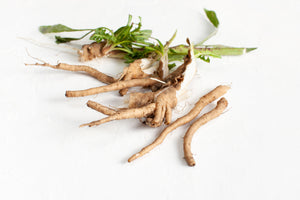
Blood sugar • Inflammation • Gut Health • Stress Response
Chicory is a perennial herbaceous plant of the dandelion family and is a bit woody due to its fibrous composition. Its fiber contains inulin, a prebiotic, and one of the better food sources to support the good bacteria in your gut microbiome.
The chicory root has been around for quite some time and has been cultivated since ancient Egypt. It has also been a popular addition to coffee in France since the 19th century, where it was commonly roasted and ground. It’s thought that coffee mixed with chicory concoction spread across other parts of Europe in the 1800s.
Chicory root has several health-promoting activities including support against inflammation. Along with digestive support and anti-inflammatory actions, studies have observed anti-bacterial, anti-malarial, antiallergenic, and anxiolytic activity from chicory root supplements, among other benefits. *
- Gut Health
- Inflammation
- Immunity
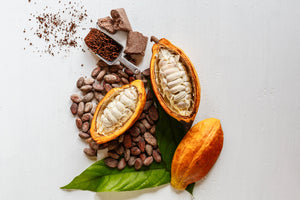
Energy • Metabolism • Mood • Hunger Cravings
Enfinity® is the branded name for synthesized paraxanthine. Paraxanthine is a downstream metabolite of caffeine that studies indicate offers the benefits of caffeine without the side effects or toxicity.
When caffeine is ingested, it’s converted into three metabolites: theophylline, theobromine, and paraxanthine. Of these three metabolites, approximately 80% is converted into paraxanthine. Enfinity® (paraxanthine) is unique because it is the most experiential, least toxic metabolite and the safest for most of the population.
As a derivative of caffeine, the benefits of paraxanthine include clean stimulation, consistent effect, enhanced mood, neuroprotective, cognition & productivity, improved blood flow, and weight management all the while being better than caffeine. * Enfinity® is a registered trademark of enfinity energy LLC TX, USA.
- Clean Stimulation
- Enhanced Mood
- Cognition & Productivity
- Weight Management